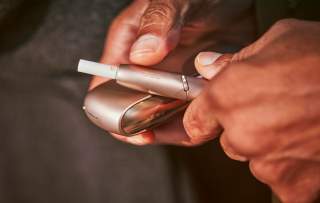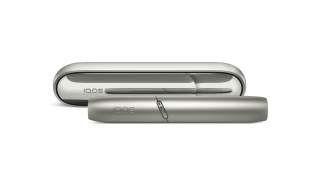IQOS is Not a Cigarette or Vape, So What is It?
It's a well-known fact that cigarette smoking is harmful. It causes serious disease and is addictive, but technological innovation has enabled the development of different smoke-free alternatives, some of which have been scientifically substantiated to be a better choice than continuing to smoke cigarettes.
Smoke-free products deliver nicotine without burning tobacco and do not generate smoke – hence the name smoke-free. Instead, they produce an aerosol that is fundamentally different to the smoke of burning tobacco. Examples include e-cigarettes or vapes and heated tobacco products such as IQOS.
While these options have been available for some time, there is still some confusion as to what exactly they are and the differences between them.
“This is partly due to widespread misinformation about smoke-free products, and in South Africa partly due to the current regulatory framework which limits adult smokers from receiving accurate and non-misleading information about heated tobacco products,” says Rishaad Hajee, Head of Corporate Communications at Philip Morris South Africa.
“To maximise their public health benefit, there needs to be a wide range of smoke-free alternatives with different characteristics, giving adult smokers who would otherwise continue to smoke a suite of products to choose from, addressing different preferences so they can fully switch,” he says. “We are often asked if IQOS is a vape? The answer is quite simply, no, IQOS is not a vape.”
He explains that IQOS heats real tobacco without burning it, while vapes heat a liquid which often contains nicotine, neither produce smoke or ash because they don’t burn tobacco.
“IQOS is an alternative for adult smokers who would otherwise continue to smoke and who prefer the taste of tobacco when considering less harmful smoke free products,” he adds. “Scientifically substantiated smoke-free products can significantly reduce the levels of harmful chemicals compared with cigarette smoke.”
It is widely accepted among harm reduction experts that delivering nicotine without burning tobacco is a positive development for smokers who would otherwise continue smoking. It is the high levels of harmful chemicals, which are the primary cause of smoking-related disease and these are generated from burning tobacco and found in cigarette smoke.
He points out that, IQOS emits, on average, 95 percent of lower levels of harmful chemicals compared to the smoke of a reference cigarette. “While this does not necessarily equate to a 95 percent reduction in risk. IQOS is not risk-free and contains nicotine, which is addictive, smoke-free products are for adult smokers who would otherwise continue to smoke.”
“The totality of scientific evidence available for IQOS in comparison with continued smoking shows that, while not risk-free, switching completely to IQOS is less harmful than continuing to smoke cigarettes,” he adds. “However, to restate the obvious: quitting tobacco and nicotine altogether is – of course - the best choice any smoker could make.”
He explains that smoke-free products have the potential to accelerate the decline in smoking rates. “When scientifically substantiated and appropriately regulated, this will ensure that smokers have correct information and access to this information and it is our ambition to replace cigarettes with these products as soon and as fast as possible.”
Heated Tobacco is Driving Cigarette Sales Down
The growth of heated tobacco products (HTPs) is increasing and in markets like Japan, is likely causing a decline in cigarette sales.
A recent whitepaper report, conducted by Frost & Sullivan - ‘Tobacco Harm Reduction and Novel Nicotine and Tobacco Products: Evidence from the Japanese Market’ shows that the sale of conventional cigarettes in Japan has reduced by 34 percent between 2015 and 2019. It states: “It is likely that the introduction of HTPs in Japan has caused a significant decline in cigarette sales, well above the previous rate of decline.”
According to the report, from 2011 to 2016, sales of cigarettes declined by about 2-4 percent annually, while a decline of 13 percent in cigarette sales occurred in 2017, 12 percent in 2018, and 9 percent in 2019, indicating a much more significant decline over this period. It concludes that the accelerated decline in cigarettes-only sales in Japan since 2016 corresponds to the introduction of and growth in the sales of HTPs.
IQOS, Philip Morris International’s leading heated tobacco product, was first available in Japan from 2014 with a limited launch followed by a full roll out by April 2016.
“These findings suggest that scientifically substantiated smoke-free alternatives, such as IQOS, have a role to play in providing smokers who don’t quit with less harmful alternatives than cigarettes,” says Philip Morris South Africa’s Managing Director, Branislav Bibic. “There is a real opportunity in South Africa to look at how this decline was achieved, and the regulations implemented by the Japanese government to make this possible in the interest of public health.”
The whitepaper report states that “the Japanese government is differentiating HTPs from conventional cigarettes in regulations, with HTPs generally receiving less-stringent regulatory settings than conventional cigarettes.”
Most notably Bibic adds that the introduction of HTPs has not caused an increase in overall sales of tobacco products, and the availability of HTPs has had a low impact on the initiation of tobacco use by never-smokers and re-initiation by former smokers.
He explains that HTPs are less harmful than smoking cigarettes because they heat tobacco instead of burning it. “Burning tobacco releases harmful chemicals which experts agree are the main cause of smoking-related diseases. “IQOS produces 95% lower levels of harmful chemicals compared to the smoke of a reference cigarette,” he says. “IQOS is not risk-free, and this doesn’t necessarily equate to a 95 percent reduction in risk, but it is a better choice than continuing to smoke.”
Bibic adds that since IQOS does not burn tobacco, it doesn’t produce tar which is one of the most harmful elements of cigarette smoke. It generates an aerosol that is fundamentally different from “tar” and consists of significantly lower levels of harmful chemicals compared to cigarette smoke.
“There are 11-million adult smokers in South Africa, which is almost one-fifth of the population, most of whom will continue to smoke cigarettes,” he explains. “Regulations that enable adult smokers to understand why these products are different from cigarettes, and that encourage those who would otherwise continue smoking to change to less harmful alternatives are needed in South Africa to accelerate the decline of smoking.”
For more information visit: www.iqos.co.za
-- ENDS --
Issued on behalf of Philip Morris South Africa.



